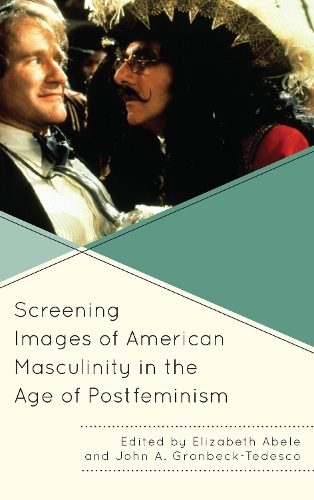
Screening Images of American Masculinity in the Age of Postfeminism
(Paperback)
Available Formats
Publishing Details
Screening Images of American Masculinity in the Age of Postfeminism
By (Author) Elizabeth Abele
Edited by John A. Gronbeck-Tedesco
Contributions by Katie Barnett
Contributions by Laura Beadling
Contributions by Brenda Boudreau
Contributions by Keith Friedlander
Contributions by Dustin Gann
Contributions by Mary T. Hartson
Contributions by Michael Litwack
Contributions by Derek McGrath
Bloomsbury Publishing PLC
Lexington Books
24th July 2017
United States
Classifications
Professional and Scholarly
Non Fiction
Media studies
Gender studies: men and boys
305.420973
Physical Properties
Paperback
220
Width 151mm, Height 229mm, Spine 18mm
358g
Description
This collection of essays presents a sampling of film and television texts, interrogating images of U.S. masculinity. Rather than using postfeminist as a definition of contemporary feminism, this collection uses the term to designate the period from the late 1980s onas a point when feminist thought gradually became more mainstream. The movies and TV series examined here have achieved a level of sustained attention, from critical acclaim, to mass appeal, to cult status. Instead of beginning with a set hypothesis on the effect of the feminist movement on images of masculinity on film and television, these chapters represent a range of responses, that demonstrate how the conversations within these texts about American masculinity are often open-ended, allowing both male characters and male viewers a wider range of options. Defining the relationship between U.S. masculinity and American feminist movements of the twentieth century is a complex undertaking. The essays collected for this volume engage prominent film and television texts that directly interrogate images of U.S. masculinity that have appeared since second-wave feminism. The contributors have chosen textual examples whose protagonists actively struggle with the conflicting messages about masculinity. These protagonists are more often works-in-progress, acknowledging the limits of their negotiations and self-actualization. These chapters also cover a wide range of genres and decades: from action and fantasy to dramas and romantic comedy, from the late 1970s to today. Taken together, the chapters of Screening Images of American Masculinity in the Age of Postfeminism interrogate the possible screened in popular movies and television series, confronting the multiple and competing visions of masculinity not after or beyond feminism but, rather, in its very wake.
Reviews
The blurring of the line between television and motion pictures is one of the paradigmatic shifts in popular culture in the 21st century. Viewers use numerous devices to access programming and often care little about the origins of the material. This reality serves Screening Images of American Masculinity in the Age of Postfeminism well, as Abele (English, SUNY Nassau Community College) and Gronbeck-Tedesco (American studies, Rampapo College of New Jersey) demonstrate how postfeminism, along with queer studies and masculinity studies, have used popular culture to critique media and society. The 12 essaysin this volume treat Robin Williams and Will Smith, the Bourne films, The Avengers, The Wrestler, and Kick-Ass and the television shows Firefly, Fraiser, Nip/Tuck, Boston Legal, Mad Men, Dexter, Miami Vice, and Breaking Bad. Perhaps due to televisions extended period of character development, the essays on that medium are particularly strong in illustrating the complicated constructs of masculinity in contemporary US culture. The editors provide an adequate discussion of the theoretical messiness of the term postfeminism. These essays allow the reader to grasp how 21st-century depictions of masculinity can be both misogynistic and protofeminist, heteronormative and bro-romantic, reactionary and sensitiveoften at the same time. Summing Up: Highly recommended. Upper-division undergraduates through faculty and professionals. * CHOICE *
Author Bio
Elizabeth Abele is associate professor of English at SUNY Nassau Community College. John A. Gronbeck-Tedesco is assistant professor and convener of American Studies at Ramapo College of New Jersey.
